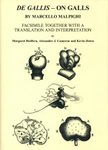Rufen Sie uns an (9:30 - 18:00 DE)
+44 (0) 1803 86 59 13International
+44 (0) 1803 86 59 13Brauchen Sie Hilfe?
HilfeDatenerfassung und Monitoring
- Aquatic Survey & Monitoring
- Professional Hand & Kick Nets
- Water Testing
- Waders & Aquatic Safety
- View All
- Amphibian & Reptile Survey
- Amphibian Survey & Monitoring
- Reptile Survey & Monitoring
- Scales, Balances & Holding Bags
- View All
Feldführer und Naturgeschichte
Akademische und professionelle Bücher
- Evolutionary Biology
- Evolution
- Human Evolution & Anthropology
- Cladistics, Phylogeny & Taxonomy
- View All
British Wildlife
British Wildlife is the leading natural history magazine in the UK, providing essential reading for both enthusiast and professional naturalists and wildlife conservationists. Published eight times a year, British Wildlife bridges the gap between popular writing and scientific literature through a combination of long-form articles, regular columns and reports, book reviews and letters.
Conservation Land Management
Conservation Land Management (CLM) ist ein Mitgliedermagazin und erscheint viermal im Jahr. Das Magazin gilt allgemein als unverzichtbare Lektüre für alle Personen, die sich aktiv für das Landmanagement in Großbritannien einsetzen. CLM enthält Artikel in Langform, Veranstaltungslisten, Buchempfehlungen, neue Produktinformationen und Berichte über Konferenzen und Vorträge.





![Genèse d'une Découverte: La Division des Infusoires (1765-1766) [Genesis of a Discovery: The Division of Infusories (1765-1766)] Genèse d'une Découverte: La Division des Infusoires (1765-1766) [Genesis of a Discovery: The Division of Infusories (1765-1766)]](http://mediacdn.nhbs.com/jackets/jackets_resizer_xlarge/23/233514.jpg?height=620)
![Genèse d'une Découverte: La Division des Infusoires (1765-1766) [Genesis of a Discovery: The Division of Infusories (1765-1766)]](http://mediacdn.nhbs.com/jackets/jackets_resizer/23/233514.jpg)
![Genèse d'une Découverte: La Division des Infusoires (1765-1766) [Genesis of a Discovery: The Division of Infusories (1765-1766)]](http://mediacdn.nhbs.com/jackets/jackets_resizer/23/233514_1.jpg)
![Genèse d'une Découverte: La Division des Infusoires (1765-1766) [Genesis of a Discovery: The Division of Infusories (1765-1766)]](http://mediacdn.nhbs.com/jackets/jackets_resizer/23/233514_2.jpg)
![Genèse d'une Découverte: La Division des Infusoires (1765-1766) [Genesis of a Discovery: The Division of Infusories (1765-1766)]](http://mediacdn.nhbs.com/jackets/jackets_resizer/23/233514_3.jpg)
![Genèse d'une Découverte: La Division des Infusoires (1765-1766) [Genesis of a Discovery: The Division of Infusories (1765-1766)]](http://mediacdn.nhbs.com/jackets/jackets_resizer/23/233514_4.jpg)




![La République Naturaliste: Collection d'Histoire Naturelle & Révolution Française (1789-1804) [The Naturalist Republic: Natural History Collecting and the French Revolution (1789-1804)]](http://mediacdn.nhbs.com/jackets/jackets_resizer_medium/22/220175.jpg?height=150&width=119)
![Exposer l'Humanité: Race, Ethnologie et Empire en France (1850-1950) [Exhibiting Humanity: Race, Ethnology and Empire in France (1850-1950)]](http://mediacdn.nhbs.com/jackets/jackets_resizer_medium/22/226791.jpg?height=150&width=105)
![Les Années Folles de l'Ethnographie: Trocadéro 28-37 [The Roaring Twenties of Ethnography: Trocadero 28-37]](http://mediacdn.nhbs.com/jackets/jackets_resizer_medium/23/239722.jpg?height=150&width=103)
![Le Spécimen et le Collecteur: Savoirs Naturalistes, Pouvoirs et Altérités (XVIIIe-XXe Siècles) [The Specimen and the Collector: Naturalistic Knowledge, Powers and Otherness (18th-20th Century)]](http://mediacdn.nhbs.com/jackets/jackets_resizer_medium/24/245112.jpg?height=150&width=104)
![Auguste de Saint-Hilaire (1779-1853): Un Botaniste Français au Brésil / Um Botânico Francês no Brasil [A French Botanist in Brazil]](http://mediacdn.nhbs.com/jackets/jackets_resizer_medium/22/228866.jpg?height=150&width=104)





![Missions du Musée de l'Homme en Estonie: Boris Vildé et Léonide Zouroff au Setomaa (1937-1938) [Missions of the Musée de l'Homme in Estonia: Boris Vildé and Léonide Zouroff in Setomaa (1937-1938)]](http://mediacdn.nhbs.com/jackets/jackets_resizer_medium/23/236564.jpg?height=150&width=103)













![Les Chauves-Souris de Guyane [The Bats of French Guiana]](http://mediacdn.nhbs.com/jackets/jackets_resizer_medium/13/134247.jpg?height=150&width=100)

![Enraciner l’Empire: Une Autre Histoire du Jardin Botanique de Calcutta (1860-1910) [Grounding the Empire: Another Story of the Calcutta Botanical Garden (1860-1910)]](http://mediacdn.nhbs.com/jackets/jackets_resizer_medium/25/255857.jpg?height=150&width=103)



![Flora of Cambodia, Laos and Vietnam, Volume 36 [Faune et Flore Tropicales, Volume 47]](http://mediacdn.nhbs.com/jackets/jackets_resizer_medium/24/245033.jpg?height=150&width=101)
![Atlas des Mammifères Sauvages de France, Volume 3: Carnivores et Primates [Atlas of Wild Mammals of France, Volume 3: Carnivores and Primates]](http://mediacdn.nhbs.com/jackets/jackets_resizer_medium/26/263780.jpg?height=150&width=106)


![Antoine-Laurent de Jussieu (1748-1836): Fabrique d'une Science Botanique [Production of Botanical Science]](http://mediacdn.nhbs.com/jackets/jackets_resizer_medium/25/259747.jpg?height=150&width=103)